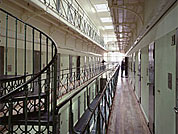Weighing up the “unusual” Swiss justice system

No other European country sends as few convicted violent criminals to prison as Switzerland. With the penal code due to be reformed, questions are being raised about whether the criminal justice system is serving the country well.
Take a sample case of aggravated bodily assault. On a night out a young man savagely beats up a passer-by in a random attack leaving the victim seriously injured. The case goes to trial, the attacker is convicted, his name is published and he goes to jail. Right? In most countries maybe, but not necessarily in Switzerland.
Under Switzerland’s strict privacy laws, the media are barred from publishing the names of convicted criminals, with few exceptions. In 2010, according to the Federal Statistics Office, just 7.6 per cent of those convicted of assault causing bodily injury were sent to jail. The majority received suspended sentences with fines.
This approach is out of step with most other European countries. According to a comparative European crime study based on 2006 figures, in Switzerland nine per cent of those convicted of assault causing bodily injury received a custodial sentence against a European average of 37 per cent.
These figures come from the European Sourcebook of Crime and Criminal Justice Statistics but the rate of custodial sentences has fallen further since then in Switzerland following a revision to the penal code which came into force in 2007.
A spokeswoman from the Federal Statistics Office confirmed that the office provided the European Sourcebook figures. However she warned that the figures do not fully reflect sentencing practice as sentences for those convicted of more than one crime were excluded, leaving a very small sample.
Even so Federal Statistics Office figures show a massive fall in unsuspended prison sentences for violent crimes in recent years. The rate of custodial sentences imposed on people convicted of violent crimes fell from 20.2 per cent in 2006 to 11.5 per cent in 2010.
Is the rest of Europe failing to move with the times or has Switzerland erred too much on the side of compassion?
Protecting society
The prevailing view among Swiss experts has been that prison sentences are of limited merit, based mainly on evidence that time in jail does not reduce the risk of reoffending any more than other lighter penalties such as suspended sentences, fines or electronic monitoring.
Criminal law professor Karl-Ludwig Kunz of Bern University explains: “Essentially custodial sentences serve to protect society from danger. That means a criminal is neutralised, made harmless to society by being locked away. That is the only sense of a custodial sentence as I see it.”
What about the deterrent effect? “I consider that it does not exist, simply does not exist. There are studies on deterrence which show no effect whatsoever,” Kunz said.
The question of punishment or retribution is also a non-starter for Kunz.
The professor argues that the victims are not necessarily looking for the offender to suffer for his or her crime. “The public is not expecting a specific level of sanction, they are only expecting a credible reaction from the state. The reaction can be valid without a custodial sentence.”
“Flawed research”
Zurich University criminology and criminal law professor Martin Killias disagrees. First and foremost he believes the bias against custodial sentences on the basis of the recidivism rate is misguided because like is not being compared with like.
The “good risks”, those who are less likely to reoffend, are overrepresented among criminals who receive alternative sanctions while the “bad risks” usually end up in prison.
Killias worked up the comparative data from the European Sourcebook in an effort to bring the issue to a wider audience. “It is important that the Swiss public realises to what extent we have an unusual criminal justice system.”
The practice of judges is not to impose custodial sentences on first time offenders in the vast majority of cases. Exceptions are made for murder or other extremely serious crimes.
Law and order
The last reform of the penal code, first drawn up in 2002, came into force in 2007. It effectively did away with short-term prison sentences and favoured the widespread use of fines and suspended sentences.
“The principles that were introduced are not unknown in other countries but in no other country did the new sanctions, such as fines and community service, take over the entire spectrum of criminal offences,” Killias said.
In addition, the law on criminal procedure does not allow for the pretrial detention of any defendant who is likely to receive a non-custodial sentence.
At the same time, there is a growing sense of insecurity in Switzerland in recent years, with the public perceiving an increase in violent crime and burglary. Reported cases of theft increased 16 per cent last year.
According to Killias, “failures” in the criminal justice system have provided an open invitation to foreign-based criminal gangs and transferred pressure onto the law on foreigners and asylum seekers. One key result: popular support for the initiative to deport foreign criminals, accepted by voters in November 2010.
“Not sustainable”
The new penal code is due to be overhauled and changes will be debated in parliament next year. One thing the government is seeking is the reintroduction of short sentences, something prosecutors would welcome.
Speaking on Swiss public radio, the chief prosecutor of canton Geneva, coping with its own local crime wave, recently said the system of day fines had created a lot a bureaucracy and was not sustainable in the long term. He looked forward to the reintroduction of short sentences “as quickly as possible”.
“Prosecutors and judges are applying a system which is really not very intelligent,” Olivier Jornot said.
Despite effectively making it the rule to suspend all sentences of two years or less, the post-2007 penal code has not had the effect of reducing the prison population, which stood at 6,065 last year.
A recent report by the Swiss sentencing implementation authorities predicted a shortfall of 880 prison places in the coming years.
One factor it identified was the detention of more psychologically disturbed prisoners who would previously (before 2007) have been looked after in mental health clinics.
It also described a bottleneck of people waiting for release.
The practice of releasing offenders after two-thirds of time served is meeting resistance. The report spoke of “a new phenomenon of hypersecurity” in society.
(Source: Report of the working group of the three Swiss sentencing implementation authorities, September 2012)
This is the fourth edition of a data collection initiative that started in 1993 under the umbrella of the Council of Europe. The present document covers the years of 2003-2006 for all areas. In-depth analysis are presented for the year 2006.
It is the largest collection on criminal justice and crime-related data covering Europe.
Cases of violent crimes (adults) 2010: 6,840
Legal sanctions imposed:
Prison sentences (unsuspended) 11.5%
Financial sanction 14.1%
Community service 3.7%
Suspended prison sentence without fine 17.4%
Suspended prison sentence with fine 53.3%
(Source: Federal Statistics Office )

In compliance with the JTI standards
More: SWI swissinfo.ch certified by the Journalism Trust Initiative







You can find an overview of ongoing debates with our journalists here. Please join us!
If you want to start a conversation about a topic raised in this article or want to report factual errors, email us at english@swissinfo.ch.